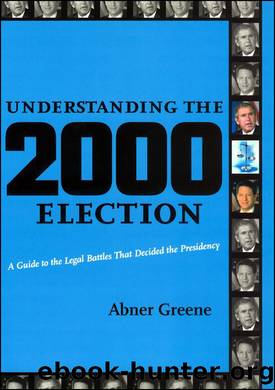Understanding the 2000 Election: A Guide to the Legal Battles That Decided the Presidency by Abner Greene

Author:Abner Greene [Greene, Abner]
Language: eng
Format: epub
Tags: Campaigns & Elections, Political Science, Political Process
ISBN: 9780814731734
Google: XfQTCgAAQBAJ
Goodreads: 575511
Publisher: New York University Press
Published: 2001-09-01T00:00:00+00:00
Despite these reasons for withdrawing his appeal, Bush did not, and the case came to the nationâs high court. Although Bush had asked the Court to consider three issues, it accepted the appeal only on two, and, as discussed in chapter 6, both boiled down to one question: Had the Florida Supreme Court legislated, rather than interpreted, thereby usurping the prerogatives of the Florida Legislature? If so, then arguably both federal law and the federal Constitution had been violated. (The Court also asked a question of its own: âWhat would be the consequences of this Courtâs finding that the decision of the Supreme Court of Florida does not comply with 3 U.S.C. Sec. 5?â)1
In his brief to the Court, Bush first argued that the Florida Supreme Courtâs judgment did not comply with the safe-harbor provision, 3 U.S.C. § 5. The safe-harbor provision grants immunity from challenge to a stateâs electoral slate if (a) judicial contests are completed no later than December 12 and (b) they are completed pursuant to law in existence as of election day. Bushâs argument was that the Florida Supreme Court had changed Florida law, thereby sacrificing the opportunity for the state to take advantage of the safe harbor. There were three central aspects to Bushâs brief on this issue. First, it pointed to Florida statutes that set November 14 as a date for counties to submit vote totals and argued that the Florida Supreme Courtâs extension of that date to November 26 constituted a rewriting of Florida law. Second, the Bush brief pointed to the Florida Supreme Courtâs ruling that the secretary of state could reject manual recount tallies only to (a) ensure a losing candidate time to contest the election or (b) ensure compliance with federal electoral deadlines. That ruling, too, said Bush, was an act of judicial legislation. Third, Bush pointed to the Florida high courtâs various invocations of its âequitable powers,â signals, claimed Bush, that the state court was legislating, rather than interpreting.
Bush next charged that the Florida Supreme Court had rewritten state law and thereby violated Article II of the U.S. Constitution. Article II grants to state legislatures the power to determine the manner of choosing electors. Bushâs contention was that the Florida high court had legislated, rather than interpreted, taking power away from the state legislature. Bushâs brief discussed in detail the framersâ decision to give power to state legislatures and explained that, although state legislatures could authorize state courts to play a role in the selection of electors, the authorization must be explicit. In Florida, argued Bush, the laws delegate to the people the power to pick the electors and delegate to the secretary of state and other officials various powers regarding vote counting and certification. The state high court, said Bush, overstepped its bounds by extending the vote counting until November 26 and in so doing violated the federal constitutional principle that only the state legislatures may determine the manner for choosing electors.
Goreâs primary response to both Bush arguments
Download
This site does not store any files on its server. We only index and link to content provided by other sites. Please contact the content providers to delete copyright contents if any and email us, we'll remove relevant links or contents immediately.
The Secret History by Donna Tartt(19088)
The Social Justice Warrior Handbook by Lisa De Pasquale(12190)
Thirteen Reasons Why by Jay Asher(8910)
This Is How You Lose Her by Junot Diaz(6887)
Weapons of Math Destruction by Cathy O'Neil(6280)
Zero to One by Peter Thiel(5802)
Beartown by Fredrik Backman(5754)
The Myth of the Strong Leader by Archie Brown(5507)
The Fire Next Time by James Baldwin(5446)
How Democracies Die by Steven Levitsky & Daniel Ziblatt(5219)
Promise Me, Dad by Joe Biden(5153)
Stone's Rules by Roger Stone(5088)
A Higher Loyalty: Truth, Lies, and Leadership by James Comey(4964)
100 Deadly Skills by Clint Emerson(4925)
Rise and Kill First by Ronen Bergman(4789)
Secrecy World by Jake Bernstein(4753)
The David Icke Guide to the Global Conspiracy (and how to end it) by David Icke(4720)
The Farm by Tom Rob Smith(4512)
The Doomsday Machine by Daniel Ellsberg(4490)
